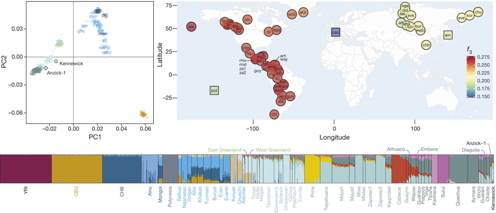PhD Summer School in Ancient DNA and Human History
Ancient DNA has revolutionized the field of archaeology over the past few years by providing unprecedented insights into past population movements, admixture events with other hominins - like Neanderthals - and adaptation to particular environments. This revolution is tightly linked with the introduction of high-throughput DNA sequencing technologies and the rise of “big data”. This intensive one-week course will provide students with a broad introduction to the varied uses of ancient DNA in archaeology and hands-on experience working with high-throughput sequencing datasets. The course is composed of a series of lectures, covering a wide range of topics and hands-on computing practicals, and is primarily aimed at students in biology, archaeology, linguistics, and related fields who would like to learn more about ancient DNA applications in the post-genome era.
Learning outcomes
- knowledge of sampling strategies for ancient DNA analysis of archaeological samples
- basic understanding of ancient DNA laboratory methods
- good grasp of bioinformatic pipelines and computational methods used in ancient DNA analysis
- understanding of the ethical implications of ancient DNA work
- ability to critically evaluate past applications of ancient DNA in archaeology
Teaching format
Teaching will take place in a mixture of lectures, interactive workshops, and hands-on computing practicals where student participation will be expected. The computing practicals will focus on data processing, visualization and interpretation. The course will be taught in English.
Workload
The work-load amounts to a total of 140 hours, equalling 5 ECTS. Students must be prepared for a considerable amount of reading before the course. However, most of these texts are of an introductory nature; the aim is to secure a minimum of knowledge of the basics of disciplines other than the student's own. The workload is distributed as follows:
- Pre-course preparation time (reading of suggested literature): 80 hrs
- Preparation during course (typically 3-4 hrs a day): 20 hrs
- In-class activities (lectures and exercises, typically 8 hrs a day): 40 hrs
Tuition fees
Free for all PhD students enrolled at Danish universities. 200 USD for all other students. For more information, please contact the student services help desk at the Faculty of Science.
Accommodation
We do not provide accommodation, but students are eligible to apply for housing through the Copenhagen University Housing Foundation for the duration of the course. For more information on costs and how to apply, please visit the Housing Foundation website.
Application and deadlines
To sign up to the course please visit the official course webpage. Deadline for applications is 29 June 2019.
At a glance
Dates: 5-9 August 2019
Location: Øster Farimagsgade 5, 1353 Copenhagen
Language: English
Credits: 5 ECTS
Application deadline: 29 June 2019
Sign up here!
Instructors 2019
- Åshild Vågene
- Fernando Racimo
- Gabriel Renaud
- Hannes Schroeder
- Jonas Niemann
- Marie Louise Jørkov
- Shyam Gopalakrishnan
- Thorfinn Sand Korneliussen
Course responsibles
- Hannes Schroeder
- Fernando Racimo
Signing up
To sign up please visit the official course page.

